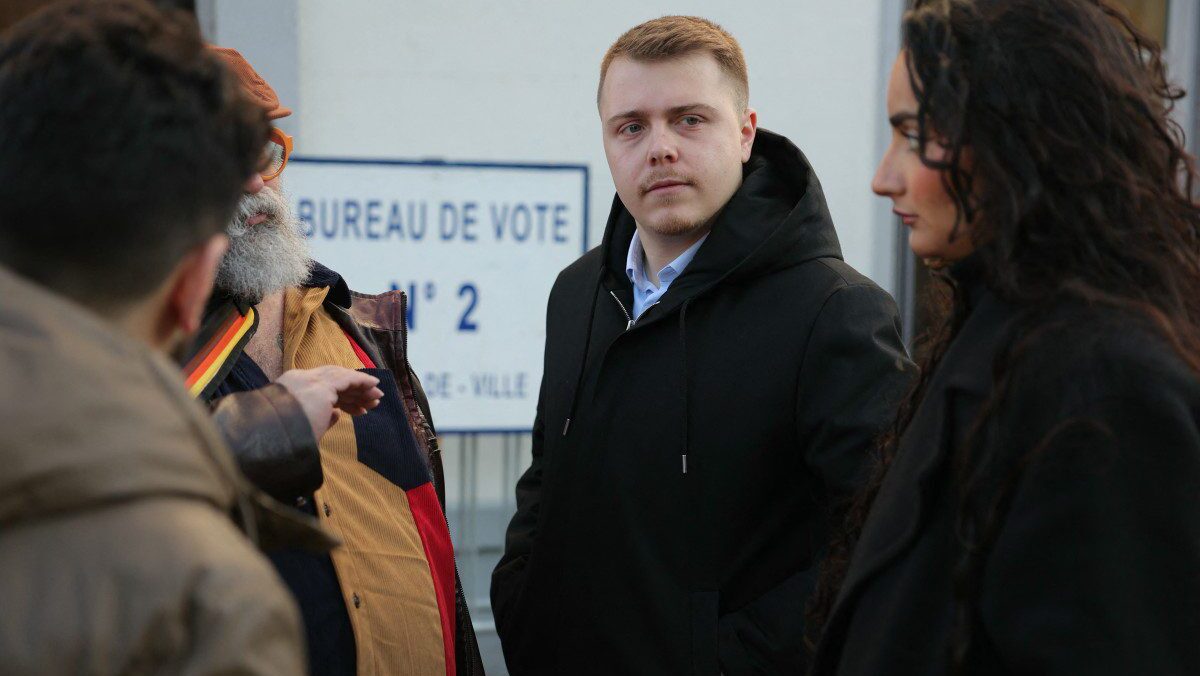
French left-wing party La France Insoumise (LFI) Member of Parliament and mayoral candidate Louis Boyard (2nd R) leaves after casting his vote at a voting station in the Paris suburban city of Villeneuve Saint-Georges during the second and last round of the city’s mayoral election on February 2, 2025.
Photo: Thomas SAMSON / AFP
On Sunday, February 2nd, the attention of the French political world fixed its gaze on Villeneuve-Saint-Georges, a small town on the outskirts of Paris. In the second round of the town’s mayoral election, a right-wing candidate and an MP from the far-left party La France Insoumise (LFI), Louis Boyard, mostly known for his support for Hamas, faced off. This local election took on national significance. For the first time, a ‘republican front’ was formed against a far-left candidate, who was heavily defeated.
The town of Villeneuve-Saint-Georges had been without a mayor since a scandal in April 2024: following a dispute with local councillors accusing him of leading a ‘far-right’ coalition, Mayor Philippe Gudin lost his temper and made a Nazi salute in the middle of the town council, prompting the resignation of more than half the council. Although he himself did not resign, the electoral code provides for early municipal elections to be held in such a situation.
The two-round ballot pitted the incumbent mayor against Les Républicains candidate Kristell Niasme—the incumbent mayor’s first deputy—and far-left MP Louis Boyard. Boyard, 24, was first elected as an MP in 2022. He is part of the younger generation of the far-left LFI party and has made a name for himself through his many provocations in the media and in the assembly. He is best known for boasting that he financed his law studies by selling drugs. Since the Hamas terror attack against Israel in October 2023, he has been a vocal supporter of the Palestinian camp and Hamas, in line with the French far Left, which pampers its immigrant and Muslim electorate.
These municipal elections were a test for LFI, which aspires to be the main opposition force in the event of new general elections but is struggling to convince even its own camp because of its repeated controversies. Although Boyard managed to secure 61% of the vote in Villeneuve-Saint-Georges in the second round of the legislative elections in July, this time he failed to convince the residents to elect him as their mayor. For the first time, a ‘republican front’ has been formed in Villeneuve-Saint-Georges and beyond to defeat Boyard’s candidacy. Until now, the term ‘republican front’ referred exclusively to the alliance of parties from the Right, centre and Left to prevent the election of representatives of the national Right (Rassemblement national), but this time a consensus was formed among all parties to elect Niasme.
In all, around fifty prominent figures from different right-wing families have called for support for Niasme, including Valérie Pécresse, former Les Républicains candidate for the 2022 presidential elections, and Bruno Retailleau, minister of the interior. Éric Zemmour, president of Reconquête, also called for Boyard to be defeated. When the leftist candidate announced his defeat he denounced the alliance of his sworn enemies, namely “Éric Zemmour, the Front National, Vincent Bolloré’s media, Valérie Pécresse.”
But it was above all the attitude of the left-wing parties, normally united in the New Popular Front coalition, that decided Boyard’s fate. “Where were the greens, the communists, the socialists when we begged for a merger? They weren’t there,” he lamented on X.
The list bringing together the three parties in question, PS-PC-EELV, came third and ended up withdrawing—yet without agreeing to merge with Boyard’s list. This highlighted the deep divisions within the French Left, which has fractured due to the excesses of La France Insoumise—communitarianism and outrageous support for Hamas. In the second round, Boyard was still the only candidate on the Left, but he failed to convince the people of Villeneuve-Saint-Georges to vote for him—a clear indication of the discredit suffered by his political party.
Boyard’s defeat confirms a trend that has already been observed: the far left is becoming increasingly marginalised because of its antisemitism.
